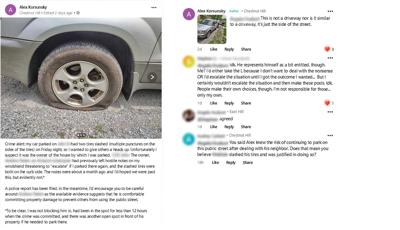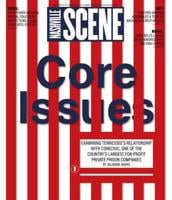
The first time Alex Korsunsky parked across the street from his apartment in Chestnut Hill, he came back to find a note on his car. He parked in the public right-of-way, but the note threatened “escalation” the next time Alex left his car in front of the author’s house.
“Crime alert: my car parked on John St had two tires slashed (multiple punctures on the sides of the tires) on Friday night, so I wanted to give others a heads up,” read Korsunsky’s first post on Nextdoor, the social media site meant to facilitate online neighbor-to-neighbor discussions.
Korsunsky had parked there again during a weekend trip in early May. He came back to find both curbside tires punctured. He went online to share the backstory and air his theory that the homeowner had perpetrated the crime. He also shared the accused’s name, address and employer. Minutes after he posted, comments streamed in. Many branched off into arguments about driveway access and the perils of ignoring a previous warning. Korsunsky monitored the post, drafting edits and responses. A few commenters offered help and sympathy. The accused neighbor fired back, telling Korsunsky he’d filed a police report for harassment. Days later, the post was taken down by Nextdoor.
“A substantial minority said, ‘You knew the risk you took parking in front of his house — he said he didn’t want people parking there,’” Korsunsky tells the Scene. “Nextdoor’s reputation is as a place for homeowners who are hyper-anxious about crime. I had compelling evidence that this guy slashed my tires and I expected people would be concerned. A lot more people were interested in litigating who has the right to park next to the curb.”
Over the past decade-plus, Nextdoor has earned a reputation as a crowd-sourced surveillance network. Users can flag “hurtful and harmful content” for moderation. Broad community guidelines, including the “kind neighbor pledge,” live deep in the site’s help center. The 24-hour eye of increasingly popular doorbell cameras has fed homeowner paranoia and generated a new crop of content, leading users to spin stills of a late-night dog walk or a mistaken DoorDash delivery into suspicious activity. Friendly questions about yard work and garden snakes far outnumber panic posting, but crime gets much more engagement than a neighbor looking for a cockapoo breeder.
“After a brief time on this board, I’ve noticed a few things,” begins a 1,070-word diatribe posted on Nextdoor on May 15 by anti-racism writer Tim Wise (of Sylvan Park). “Please bear with me.” With academic rigor and a flurry of statistics, he debunks the site’s ill-informed and alarmist rants about crime, homelessness and politics.
When his tires got slashed, Korsunsky also posted his story on r/Nashville, a Reddit community where users discuss Nashville-related happenings. Commenters recommended replacement tires and helped Korsunsky plan his next move. The most popular comment encouraged him to bait another incident and get it on camera.
Online communities like Nextdoor, Reddit and Facebook have built out message boards for tens of thousands of Nashvillians. Groups like “16th District Nashville” and “Nashville Progressive Moms” form communities around political boundaries and identity, sharing links and providing space for members to rant, confide, connect, warn, share and, sometimes, bully. Cross-posting ferries content between groups and platforms, like a recent screenshot explaining that the teenage boys who might come to your door asking about your yard are not from the Tennessee Department of Agriculture. They are actually hoping to sell you lawn care.
Ten rules govern the 71,000 members of the East Nashville Facebook group. Candice Raines is one of a team of admins who approve posts one by one. Raines and her fellow moderators tackle hundreds of pending posts every day.
“Every time there’s a group that’s not moderated, you get weird postings at weird times of day,” says Raines. “Everyone’s selling an NFT, people are catfishing for who knows what. Those are easy. We just try to make sure it doesn’t turn into a giant hot spam mess. The most important rule is: Be nice to people. It won’t hurt you.”
From Nextdoor drama and TikTok bans to broadband access and beyond, here’s a look at Middle Tennessee’s internet footprint






